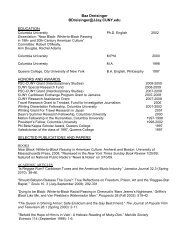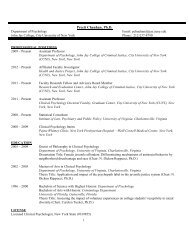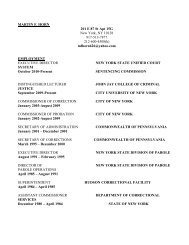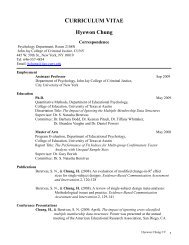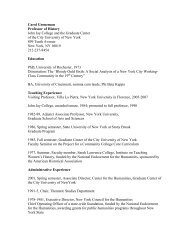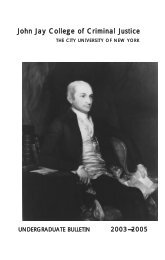Bulletin - John Jay College Of Criminal Justice - CUNY
Bulletin - John Jay College Of Criminal Justice - CUNY
Bulletin - John Jay College Of Criminal Justice - CUNY
You also want an ePaper? Increase the reach of your titles
YUMPU automatically turns print PDFs into web optimized ePapers that Google loves.
Courses <strong>Of</strong>fered<br />
must be completed in order to receive credit as a general education<br />
science equivalent.<br />
Prerequisite: BIO 101 is available to students who do not place into<br />
BIO 103 and are majoring in Forensic Science<br />
BIO 102 Paced Modern Biology I-B<br />
6 hours; 3 hours lecture, 3 hours laboratory; 3 credits<br />
Paced Modern Biology 1-A/1-B is a two-semester alternative to<br />
Modern Biology I for those students who do not place into Biology<br />
103. The series is an in-depth exploration of the basic properties of<br />
living systems on the molecular, cellular, and organismic levels.<br />
Topics in Biology 1-B include gene structure, function, and<br />
regulation. In the laboratory students will learn basic laboratory<br />
skills and experimental techniques including measurement,<br />
identification of macromolecules, genetic crosses, and forensic DNA<br />
analysis. The entire 101/102 series must be completed in order to<br />
receive credit as a general education science equivalent.<br />
Prerequisites: BIO 101 and majoring in Forensic Science<br />
BIO 103 Modern Biology I<br />
7 ½ hours; 3 hours lecture, 1 ½ hours recitation, 3 hours laboratory; 5 credits<br />
Modern Biology I is the first half of an in-depth exploration of the<br />
basic properties of living systems on the molecular and cellular<br />
levels. Students will be introduced to cell structure, metabolism and<br />
respiration, photosynthesis, and genetics. Representative organisms<br />
from the prokaryotic and eukaryotic kingdoms are studied in detail.<br />
The laboratory portion of the course is designed to reinforce the<br />
concepts taught in the lecture and to teach basic laboratory skills.<br />
This course is designed for students with a science background and<br />
for Forensic Science majors.<br />
Prerequisites: SAT Verbal score of 520 or higher or completion of<br />
the New York State Biology Regents with a score of at least 80%.<br />
Students who did not take the Biology Regents will need<br />
departmental permission.<br />
BIO 104 Modern Biology II<br />
7 ½ hours: 3 hours lecture, 1 ½ hours recitation, 3 hours laboratory; 4 credits<br />
This course is the second half of the Modern Biology sequence. It<br />
continues the in-depth exploration of the basic properties of living<br />
systems on the molecular, cellular, and organismal levels. In addition,<br />
evolution and ecology are introduced. Representative organisms from<br />
the plant and animal kingdoms are studied in detail. The laboratory<br />
portion of the course emphasizes phylogeny and teaches basic<br />
microscopy and dissection skills. This course is designed for students<br />
with a science background and for Forensic Science majors.<br />
Prerequisites: BIO 103, or BIO 101-102 or equivalent with an<br />
average grade of 2.0 or higher in the two courses<br />
BIO 255 The Biology of Gender and Sexuality<br />
(Same course as GEN 255)<br />
3 hours, 3 credits<br />
This course approaches the issues of gender and sexuality from the<br />
perspective of the biological sciences. By exploring the evolutionary<br />
origins of sexual reproduction, students will gain new insights into<br />
how and why sex and gender differences in animals, including<br />
humans, came to be. By gaining a solid grounding in basic sexspecific<br />
anatomy, physiology, and endocrinology, students will have<br />
a framework to consider several further topics, such as: gender-based<br />
medicine and the masculinized state of priorities in the biomedical<br />
industry; hermaphroditism, transexualism, and sexual reassignment;<br />
and reproductive biology and medicine. Finally, the course will<br />
examine sexual orientation and the study of its biological nature and<br />
origin, both in humans and in the animal world.<br />
Prerequisites: ENG 101, NSC107 or BIO103 or, BIO101 and<br />
BIO102<br />
BIO 315 Genetics<br />
3 hours, 3 credits<br />
Genetics is an introduction to the field of modern genetics. Topics<br />
are drawn from classical, molecular and population genetics and<br />
60



